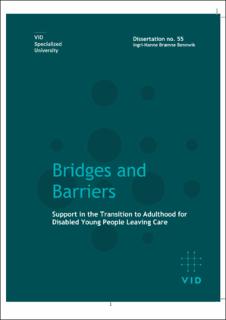| dc.description.abstract | This study explores support for disabled young people leaving public care in Norway. Such support, called aftercare, is offered by municipal child welfare services to care-experienced people aged 18-24 years. Some people receiving aftercare have experiences of disability, and the support provided to this group of young people is the core focus of this study. While the study is an intersectional analysis of factors related to both disability and aftercare, its focus is directed on professional practice with disabled young people leaving care in the context of Norwegian child welfare services. As such, it is situated within social work practice research in broad terms and, more specifically, the field of care-leaving research.
The following is the overall research question that guides this study:
How do ruling constructions of aftercare and disability shape support for disabled young people leaving care in Norway?
This question is explored through three sub-studies that elaborate on the following themes:
- What aims are expressed in Norwegian policy regarding public support for disabled young people with care experiences?
- How do disabled care-experienced young people encounter aftercare support in their transition to adulthood?
- What characterises social workers' professional considerations about support for disabled young people ageing out of care?
The study involves a document analysis of eight Norwegian government white papers on disability and aftercare services, qualitative interviews with eight young people, and a qualitative vignette study with 14 social workers in child welfare services who were engaged in providing aftercare support. Data were generated from May 2018 to August 2020. The analysis was informed by concepts stemming from institutional and critical theories. Institutional perspectives explain how the individual experiences of young people and social workers are connected to the larger social organisation of aftercare and how practices and understandings are influenced by certain institutional premises in the Norwegian child welfare system. These critical perspectives help question how disability as a form of social oppression is produced and enacted within the context of aftercare in Norway.
The findings of the study have been reported in three papers, each highlighting one of the three sub-studies:
1 The review of government policy shows that disability receives no attention within the policy on aftercare and aftercare or experiences of public care are not emphasised within the policy on disability. The analysis suggests that aftercare policy expresses the overall value of adult independence. It also highlights the absence of adequate guidance regarding the transition process for young people with ongoing needs when they exit child welfare services.
2 The interviews with disabled young people leaving care reveal that their needs and experiences related to disability are ignored as they are perceived to fall outside the remit of aftercare services, and the young people are largely left to manage alone. While many of these young people expressed a sense of agency and capability during their transition out of care, they also shared accounts of their interactions with adult services as draining and reported insufficient support for their needs.
3 The interviews with social workers bolster these findings, suggesting that their considerations about aftercare support are not influenced by concepts of disability but rather are guided by three institutional logics that are categorised as a medical logic, an activation logic, and an aftercare logic.
Overall, the study suggests that support for disabled young people leaving care is built upon an individualised and medical concept of disability and the overall value of adult independence. These constructions of disability and aftercare materialise in legal, organisational, and financial structures that do not facilitate the kind of support necessary to satisfactorily address the intersectional and ongoing needs of disabled young people leaving public care.
It is argued that disability, through the medical model understanding, is constructed as an exception category within aftercare services. The aftercare institution's response to this 'exceptionality' is the segregation and assimilation of disabled young people leaving care. Segregation is how young people with a clear diagnosis are perceived to belong to other services and are rapidly transferred out of child welfare services after the age of majority. Assimilation is an 'unresponsive' response to disability based on ableist norms and an assumption of homogeneity within the care-leaving population. This materialises in an interaction between child welfare services and young people where nobody addresses disability. The young people often contribute to the assimilation by adjusting their wishes and needs to fit within what they perceive as the responsibility of child welfare services.
Both the assimilation and segregation of disabled young people leaving care render their needs unmet by child welfare services. This lack of support constructs barriers in young people's transition out of care, rather than building a bridge to services that can support them in achieving their aims and wishes for adulthood. It is argued that child welfare services will benefit from social and critical perspectives of disability to better respond to intersecting experiences of disability and leaving care and to better address the disabling barriers that young people face in their transition out of care.
Paper I: Bennwik, I.H.B., & Oterholm, I. (2021). Policy values related to support for care leavers with disabilities. European Journal of Social Work, 24(5), 884–895. https://doi.org/10.1080/13691457.2020.1751589
Paper II: Bennwik, I.H.B., Oterholm, I., & Kelly, B. (2023). ‘My disability was my own responsibility’: An institutional ethnography of the transitional experiences of disabled young people leaving care. Children and Youth Services Review, 146, 106813. https://doi.org/10.1016/j.childyouth.2023.106813
Paper III: Bennwik, I.-H. B., Oterholm, I., & Kelly, B., (2023). ‘Disability is not a word we use’: Social workers' professional judgements about support for disabled young people leaving care. Child & Family Social Work, 28(2), 443-453. https://doi.org/10.1111/cfs.12975 | en_US |
